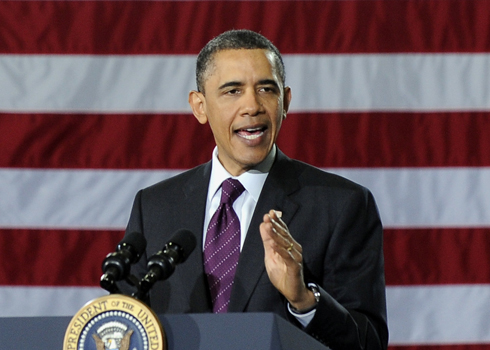President Obama’s first term has been marked by a tendency to take the liberal policy consensus on any issue, move five clicks to the right, and begin negotiations having already conceded quite a bit to conservatives.
His new push to pass a $447 billion jobs plan, and reduce out year deficits in large measure by raising taxes on the rich marks a significant departure from the status quo ante. And it sets Obama up for a risky, but important and necessary fight with Republicans over the country’s future.
Put it all together and his plan would juice the economy in the near-term, and pursue a vision for the country that’s just about the opposite of the GOP’s. In effect, it serves as a rebuke to House Republicans — and particularly House Speaker John Boehner — who walked away from an equally far-reaching plan that would have been much friendlier to conservative interests.
The House-passed GOP budget would have achieved medium and long-term budget sustainability almost entirely by slashing deeply into Medicaid spending, and unloading the huge cost of Medicare on to seniors by turning it into a subsidized private insurance system. It raised no tax revenue, and likely would have resulted in much lower revenues than under current policy.
Obama’s plan works in a diametrically different direction. It would result in at least $1.5 trillion in new tax revenue over the next 10 years exclusively from the wealthiest percent or two of Americans. It would find modest concrete savings from Medicaid and Medicare, extend the life of Medicare itself and at the same time strengthen a new government panel tasked with bringing Medicare spending growth down to a manageable level. Make health care leaner first so that federal health care programs don’t have to be slashed to the core, or lose their single-payer nature.
It’s a dichotomy Obama’s is already taking to voters. In his Rose Garden address Monday he put it like this:
“Either we ask the wealthiest Americans to pay their fair share in taxes, or we’re going to have to ask seniors to pay more for Medicare,” Obama said. “We can’t afford to do both.”
Compare this to the plan Obama and Boehner nearly agreed to — to raise the Medicare eligibility age, to leave taxes on the rich at their current levels, to reduce Social Security benefits — and it’s hard to escape the conclusion that — for a number of reasons — Obama’s decided to stop preemptively meeting Republicans half way. Republicans can’t get to yes with Obama, even when he starts in the middle. Voters may like Obama personally, but his approval ratings scraping against the floor. And with the GOP primary heating up, people are tuning back into politics and need to know who’s fighting for what. As Vice President Joe Biden’s former chief economist Jared Bernstein told the Wall Street Journal. “I think this is less ‘Let’s be the grownups in the room and start at the 50 yard line,’ and more ‘Let’s start on our side of the field.'”
White House spokesman Dan Pfeiffer offered a different explanation to the New York Times.
“The popular narrative is that we sought compromise in a quixotic quest for independent votes,” he said. “We sought out compromise because a failure to get funding of the government last spring and then an extension of the debt ceiling in August would have been very bad for the economy and for the country,” Mr. Pfeiffer added. “We were in a position of legislative compromise by necessity. That phase is behind us.”
That’s not to say everything in the plan has liberals rejoicing.
The plan would save billions by cutting federal retirement benefits, and instituting further means testing of certain Medicare programs on wealthier beneficiaries — in other words, it would require some seniors to pay more. It makes the safety net more efficient by allowing Medicare to enjoy the same rebates for prescription drugs that Medicaid currently enjoys, but doesn’t in a fundamental way expand the safety net.
But it’s a huge departure from the Obama of the tax fight, and the debt limit fight, and its greatest attribute is that it makes the stakes crystal clear.
Get the day’s best political analysis, news and reporting from the TPM team delivered to your inbox every day with DayBreaker. Sign up here, it takes just a few seconds.










